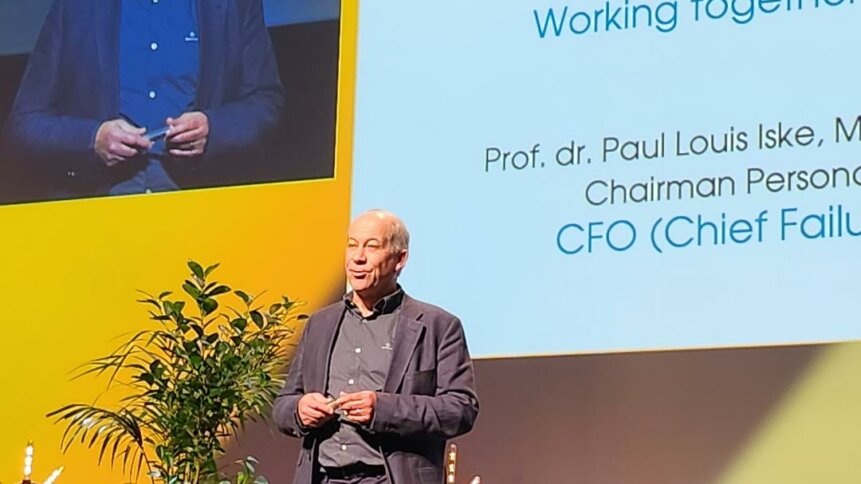Kickstart Europe – measuring creativity in the data center industry

Kickstart Europe – the premier European data infrastructure conference that discovers and sets the agenda for the industry for the rest of the year – took place in Amsterdam on February 21, and Tech HQ was there.
If you’re going to hold a conference on a range of subjects which can be dry – like data centers – and can also be controversial in terms of their impact on the lives of the general public, and the reception they get, you need to begin the event by booking Professor Doctor Paul Iske as your chair for the day.
Professor Doctor Paul Iske is, among much else, the founder of the Institute of Beautiful Failures, and he treated Kickstart Europe 2023 to an opening that was delightfully and impishly at odds with the feverishly serious networking business of most conferences (and indeed, for the most part, of this one).
Complex vs complicated.
While bringing some statistics to show that schools kill creativity (his wife’s a teacher, so there’s a sense of this being the Dutch sense of humor writ large, with graphs), there was a serious side to his fun, as he differentiated what is merely complicated – something like a Swiss watch, that works in a way that is hard to understand, but which can be reliably mastered, understood, and eventually predicted – and what is complex, which can be many overlapping systems and individual elements, all subject to the random (or consequential) influence of chance, and which can only be understood on its own terms.
Believe it or not, the point of that distinction was to ask the conference how the world of data centers (which for the most part are simply individually complicated) can deal with the complex new market in which they exist, as new players, stakeholders and developers flood into the system because, as he said, the general public has mixed feelings about data centers.
This was all before breakfast – which is why it needed Iske’s light touch and his deadly accurate whimsy to put the point across.
The cost of the future.
“They want internet, and cloud, and connectivity – but they don’t like data centers,” he said of the public, explaining the dichotomy and the reason for the relatively recent flooding of the previously merely complicated market with new players. That insatiable demand for the cloud and its many benefits needs to be serviced – even if people have doubts about the ways in which that service treats resources like land and energy in order to get the job done.
If you wanted to genuinely predict the way in which the industry was about to develop across 2023, he explained, you had to find a way to bring in societal factors, rather than treating data centers like islands in a sea of splendid isolation.
That in turn meant finding a way to measure creativity in data center design.
Did we mention this was all before breakfast?
Never fear – Iske was here, with a scale that helped measure creativity in large projects, like data center design. It’s a matter of multiplying how many questions you ask in a day by the number of times you laugh over the same period.
No, apparently quite seriously – there were, as mentioned, graphs to back up his thesis. Children laugh over a hundred times a day, and by the time we’re 44, that’s reduced on average to just 11. 11 times a day. On average, which means far too many of us will be in single figures.
Similarly, the number of questions asked by children on a daily basis ranges between high double-figures and mid-triple figures.
You don’t want to know how few times a day grown adults ask meaningful questions. Hence the theory that schools kill creativity stone dead.
Describing the elephant.
Again, with Iske, there’s always a point behind the humor. How, he asked the delegates, do you measure an elephant if you’re blindfolded?
Various people, encountering various parts of the elephant, will come up with a range of guesses as to what it actually is they’re measuring. Trunk-measurers may imagine they’re measuring a snake, leg-measurers a tree, tail-measurers a rope, and so on. It’s only by communication, through asking questions and pooling data, that the nature of the elephant is revealed to all the siloed types of measurers. And everybody benefits from the clearer idea of the task at hand.
That, he explained, was analogous to intelligent organizations. They looked a problems and opportunities from several different viewpoints, and they asked new questions – especially questions that prompted speculative and imaginative thinking, like “What would happen if…?”
Intelligent organizations, he said, dealt with dynamic creativity. Dealt with other people. Dealt with change. Dealt with uncertainty. And particularly, dealt with reality.
In which regard, he said that it was a danger to creative culture to get trapped in a kind of social media mindset, where no-one ever took selfies if there were clouds in the sky – or if they did, they erased them with a simple tool, so that only the nominally-agreed “best” image, of clear skies (and, come to that, beautiful people – what we do to skies, we also do to complexions, waistlines, six-packs and the like) survived. We don’t “live our best life” – we Photoshop it – but if we do that, we miss out, and everybody, at heart, knows we’ve faked it.
The power of failure.
“Are we ashamed of what we do?” he asked the crowd, a large proportion of which was made up of data center company staff (remember that point where the general public don’t like data centers?).
“Are we ashamed of the ups and downs of it? Do we want to only show the sunny days of our business? Why don’t we accept that things go wrong? Why don’t we accept failure in complex things as part of the process of making them better, and of getting to better results?”
Having strayed perhaps a little too close to pre-breakfast introspection for some in his crowd, he returned to meaningful whimsy. “It’s important to remember the equation NT+OO=EOO,” he advised his audience. “New Technology+Old Organization=Expensive Old Organization.”
There were actually gasps in the room when he said that, along with wry chuckles. The point of course was that while new technology is generally an excellent and necessary thing, if you add it to an organization that’s not ready to embrace its potentially transformative impact, all you end up with is the same old organization, but with high-tech chrome on its bumpers.
But while advising the room full of data center and digital infrastructure players to take people and organizations along with them on their exciting journey into the world of new technological developments, he re-stated – this time with no overt whimsy – his certainty that if it kept asking questions, and stopped to laugh more often, the data center industry will make the world a better place, irrespective of current doubts over its colossal energy draw and land usage.
The crowd cheered – after all, no-one wants to believe they’re the bad guys, so an affirmation of making the world better is always welcome – and the 2023 Kickstart Europe conference had been well and truly kicked into life. Though it was still quite a long way from breakfast.










